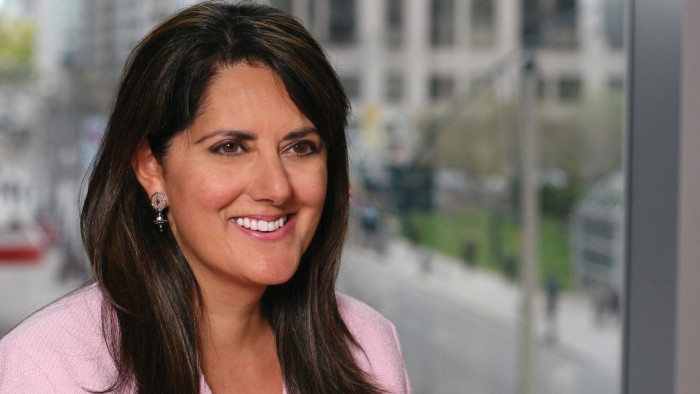Jyoti Chopra, global head of diversity and inclusion, BNY Mellon

Roula Khalaf, Editor of the FT, selects her favourite stories in this weekly newsletter.
Jyoti Chopra was born and raised in north London with her two younger sisters. Her family were first-generation Indian immigrants and both her parents worked — her mother was an early role model as she continued to work as an interpreter until her early seventies.
Ms Chopra moved to the US to attend New York University, where she earned a social sciences degree. She later completed an executive education programme at the Wharton School of the University of Pennsylvania and is currently doing an Executive MBA at Saïd Business School, Oxford.
Her previous experience includes the United Nations, Merrill Lynch and Deloitte. The UN, in particular, was a transformational experience, dealing with war, disasters and emergency relief operations.
Ms Chopra divides her time between Manhattan, New York and Princeton, New Jersey, where she raised her son, Kabir. She enjoys travelling, playing tennis, swimming and Zumba classes. To relax she likes to watch Bollywood movies.
Who are your business influences?
The chairman and chief executive of BNY Mellon, Gerald Hassell, since he’s a more than 40-year veteran of the firm. Karen Peetz, the bank’s president, as she is currently the only female president of a major Wall Street firm and leads several businesses and major client areas. And James Gorman, chief executive of Morgan Stanley. Through these people I stay abreast of economics.
Why did you choose Saïd Business School, University of Oxford?
The key was to follow a programme for developing and refining business, technical and operational management skills. The Oxford EMBA programme covered aspects that aligned with my career ambitions: such as decision-making in a highly complex, regulated global market and learning how to conduct business in emerging markets.
What do you enjoy most about your job?
Being a part of business that is driving change and cultural transformation through its people. Serving as an advocate for gender parity and diversity, and demonstrating the business case for inclusion is compelling and unique. There is no other job like it. Each day is different and each day I meet and touch the professional lives of many and that is incredibly satisfying.
What do you find most difficult?
I find dealing with conflict or controversy challenging at times. It is, however, a rite of passage. Bold decision-making is a key hallmark of leadership. There are times when you will have to face difficult people, overcome obstacles or deal with unexpected situations. It is essential to learn from past mistakes and not to be afraid to put yourself in tough situations.
What is the biggest challenge you have ever faced and how did you overcome it?
Coming to the US alone as a young woman, leaving my family in the UK, was challenging. I arrived knowing virtually no one and worked full-time to finance my university education in New York. Holding down a full-time job and studying the equivalent of a full-time course was a struggle, but an accomplishment that afforded great pride. Working in financial services on Wall Street, where there are few south Asian female role models and breaking into leadership ranks was also incredibly challenging, but important for paving the way for others.
What is the best piece of advice given to you?
There are several, in fact. My present manager, BNY Mellon’s chief human resources officer recently reminded me about the notion of “mind over matter” as I was tackling a particularly challenging course within the EMBA. The second is from the former global chief operating officer at Deloitte who taught me to “invest in the success of others”, which has helped to keep me grounded and focused on building up others and contributing to broader efforts beyond my immediate remit. The third is from the former global chief executive of Deloitte, who taught me that “proper planning prevents poor performance”.
What is your favourite business book?
Presentation Zen by Garr Reynolds. The book expands on the elements of “sticky” messages such as simplicity, surprise, concreteness, credibility, emotion and story. It includes 10 graphic design principles and insights to reframe your approach to business communications. “This is a book about communication and seeing presentations in a slightly different way, a way that is in tune with our times,” he writes.
Which three people, living or dead, would you invite to a business meeting?
Winston Churchill, for the power of his oration, Julian Fellowes, for the power of his pen and prose and Henry Paulson, a former US Treasury secretary for leadership power and prowess, and to really understand the dynamics of crisis management and the lessons learnt from the global financial crisis.
What has been your best business trip?
A visit to London in April last year to attend and participate in the Oxford-Cambridge boat race. BNY Mellon has been the event’s sponsor for the past several years and organises a number of client events in conjunction with the occasion. Last year the men’s and women’s boat races were both held on the same day for the first time. It was poignant to be there, standing on the bank of the river Thames to see a powerful symbol for gender parity being realised. I was particularly thrilled to see Oxford win both races.
If you could do it all again, what would you do differently?
I would have reversed experiences and started in financial services, developed sector specialisation, then headed to a non-profit. What’s important are the life-long lessons you learn and how you apply them. Challenges, mistakes and failures: it is how we respond, learn, evolve and emerge from these experiences that form exceptional leaders.
Comments